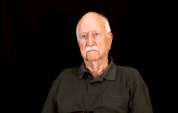7:30 | Fischer found basic infantry training to be lacking in challenge since he was a boy scout growing up and was so used to hiking around his home area. From there he was transported to Fort Bragg for weapons training, and then went overseas on the USS George Washington. Soon enough his division arrived in France and he had his first combat experience. He distinctly remembers having to fight German forces as they moved through the Vosges Mountains. (This interview made possible with the support of RON TODD.)
Keywords : Glen Fischer Camp Croft SC infantry training Fort Bragg weapons training Boy Scout USS George Washington (CVN-73) France combat German army Vosges Mountains Marseille France Army Specialized Training Program (ASTP) North Carolina anti-tank overseas Camp Kilmer New Jersey Mediterranean Sea Gibraltar Raon L'etape France

Upon graduating high school in Virginia, 18 year old Glen Fischer had little money for college at the time, and wound up attending Virginia Tech in a mechanics program that following year. His hope was to get into the Army Air Corps, and he figured working on an aircraft assembly line before volunteering would help him do that. Unfortunately, the Army had other plans for Fischer. 6 months later, he would be sent to Camp Croft for infantry training. (This interview made possible with the support of RON TODD.)
Often times during combat, it was Fischer's job as gunner to fire his company's anti-tank gun when they spotted enemy tanks. Other times, he was put in the middle of the rifle company to help aid them. He only had to use his gun twice, and once was when he destroyed a stone house in the way of the artillery men. For this, Fischer received a bronze star. When the Germans carried out Operation Northwind all throughout Bitche, France, it resulted with Fischer getting shot and wounded in the arm. (This interview made possible with the support of RON TODD.)
After being wounded in the arm, Glen Fischer was taken out of combat and transported to a hospital over in Paris, France. By the time he was healed and ready to rejoin his company, the war was already over. He made it as far as waiting in a replacement depot, but never actually went back into combat after his injury. From there, he was placed into occupation duty until February of 1946, where he was promptly sent home. (This interview made possible with the support of RON TODD.)